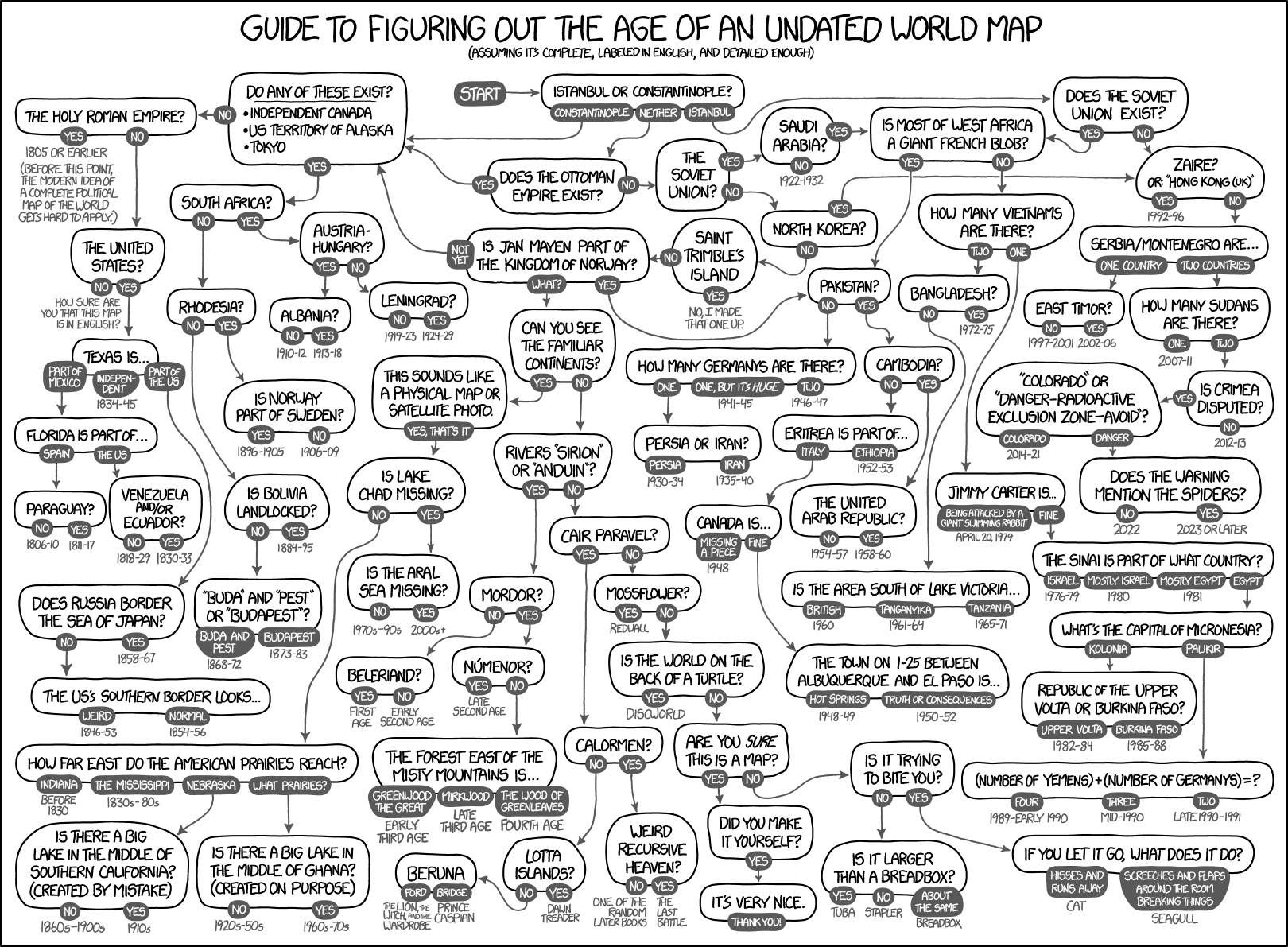How Old Is Your Map?
From xkcd:
Title text: Does the screeching chill your blood and herald death? If yes, banshee. If no, seagull.
The folks at Explain xkcd attempt to play along and go through the entire decision tree but appear overwhelmed. This is no longer fun and games.
What began as a kicky, tongue-in-cheek pre-VOX explainer site has descended into pathology/madness and borderline incoherent babbling in spots:
Explanation
This explanation may be incomplete or incorrect: Many is [sic] still missing.
Flowchart depicting various ways to tell what era a map is from based on present country borders and land forms. (Except in the Not a Political Map Branch (from "Can you see the familiar continents?" downwards), the comic assumes a political map.) Most of the options are very serious, with a few bizarre options (mistaking a seagull and breadbox for a map) or references to things like the Discworld books and Middle-earth, the setting of the Lord Of the Rings series. He also mentions US President Jimmy Carter being attacked by a giant swimming rabbit, an event previously referenced by 204.
Additionally, (possible) future maps including a "Radioactive Exclusion Zone" in the place of Colorado are mentioned. It predicts that some kind of nuclear incident will occur in Colorado (possibly at Rulison or Rio Blanco nuclear testing sites) in 2022. It also predicts that the area will be infested by radioactive spiders one year later.
The title text continues the path where the user has confused a seagull for a map by inquiring if the (presumed) seagull might be a banshee based on the effect of its screams.
There is no recursive loop.
(First Draft, please expand.)
Going through the flowchart, taking the leftmost path first, recursively. See Depth-first search. "Prior Date Range" is the range determined immediately before the question, carried over from the previous question; "Question Date Range" is the range each answer choice implies; "New Date Range" is the intersection of the Prior Date Range and the Question Date Range for each choice, and is the range determined by all questions hiherto answered.
| # | Question | Explanation | Prior Date Range | Question Date Range | New Date Range |
|---|---|---|---|---|---|
| 1 | Istanbul or Constantinople | The largest city in Turkey is famous for having different names at different times or to different people. Variations on both names go back at least 1,000 years. Other names have also been used at various points. İstanbul has been the official name since the 1920's, although Western maps often referred to it as Constantinople as late as the 1960's; on the flowchart, the choice of name appears to go with the 1920's date. The name changes are the subject of a song, originally by the Four Lads, but now mainly known for the They Might Be Giants recording. | Start here |
|
|
| Note: the chart splits here into three divisions, each from a choice in question 1. The Neither Division will attempt to use other indicators to sort maps into one of the other two divisions or branches thereof, or, after 5 failures to find a country, conclude that the "map" in question is not a political map and proceed to find out what it is (the Not a Political Map Branch). The Constantinople and Istanbul Divisions are linear except where the Neither Division joins them as stated above. | |||||
| Constantinople Division | |||||
| 2 | Do any of these exist?
|
All these seem to specify a date cut-off of 1867/8, but there are caveats attached to each:
|
-329 - 1928 (from 1) 1299 - 1922 (from 19 in the Neither Division) (from 24 in the Neither Division) |
|
|
| Holy Roman Empire Branch | |||||
| 3 | The Holy Roman Empire | The predecessor to modern Germany, the Holy Roman Empire was a union of hundreds of small states in Central Europe. Nationalism and the concept of the nation state hadn't taken off yet, so countries as we know them didn't really exist. There were just small lands, often with keenly contested borders, owned by minor aristocracy who pledged allegiance to one of the big powers. The HRE was dissolved in 1806 after it was invaded by Napoleon, arguably the first leader to realise the potential of making a nation salute a flag. | -329 - 1867 |
|
|
...So MUCH MORE
